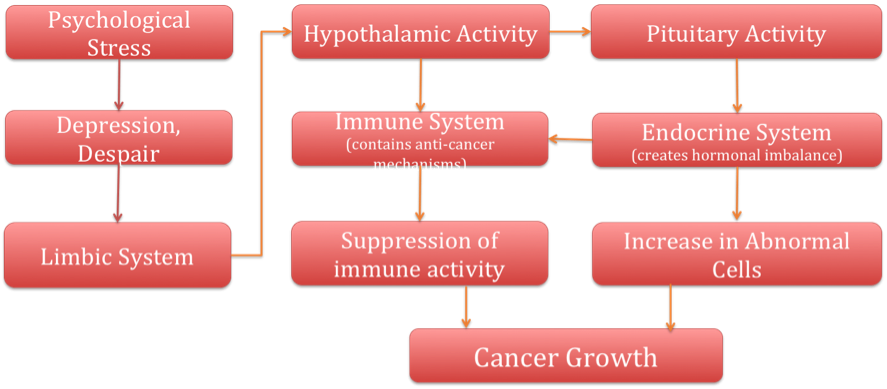Dec 15/17
PNI and Cancer – Can we participate in our recovery?

We have all heard that stress predisposes us to illness. But how does stress really increase our susceptibility to illness?
The body is built with homeostatic mechanisms to protect it from diseases and it keeps a close surveillance to keep itself safe and healthy. The generation and remission of disease is an intriguing and mysterious phenomenon for clinicians and patients.

We now know that cancerous cells are produced in everyone. Dr. Carl Simonton has done pioneering work in mind-body medicine and the results of his work have seen an increased spontaneous remission of cancer! Let’s take a look at the mind-body model and see exactly how psychological processes actually create a climate for cancer growth.
So what happens where the immune system is unable to do this critical job? There are two pathways are at work here as shown in the mind-body model: the first being the presence of abnormal cells and the second being the suppression of the body’s immune system.
I am not suggesting that chronic stress alone is a contributor to illness here. Obviously, factors like diet, exercise, genetics and external agents create a predisposition and are also contributing factors. In either case, whether the illness is psychosomatic or not (i.e.: caused by psychological factors such as stress), it still does not make the illness any less real.
Let’s look at this from a treatment perspective. Conventionally, treating diseases is largely a physical process – a physical disease treated by physical means i.e. medication or invasive procedures. But the placebo effect is undeniable. For long physicians have seen how a ‘positive expectation’ that the sugar pill (unknown to the patient) has resulted in spontaneous remission of a symptom or illness. From this, we can see the intricate and powerful connection between the mind and the body. It is, therefore, time to tackle illness on a more holistic level as well – treating the mind, body, and soul.
Now, you may be thinking that everybody experiences stress in their lives but not everyone ends up with a critical illness. So what’s the explanation to this? One compelling theory is how ‘reaction’ to stress in individuals’ sets up a chain of hormonal changes which impacts immunity.
As we can see from the diagram, part of the hypothalamus is responsible for controlling our immune system and a part of the hypothalamus influences the pituitary and endocrine functions. We can also see how stress and despair impacts the limbic system and how it influences our hypothalamus. Evidence increasingly suggests that the hormonal imbalance that is created due to cell-mediated changes in the hypothalamic axis in adrenal hormones has been shown to create a greater susceptibility to carcinogenic substances (i.e.: substances that directly cause cancer). This predisposition to increased abnormal cell production accompanied by a less than potent immune system makes for a lethal combination.
Now that we have some understanding of the mind-body pathways, can we not reverse this cycle to recovery? Can we actually participate in our recovery?
Following the same theory, indeed we can! But this is a topic for another day. Stay tuned to the Inner Compass Blog for more.
Want to know more? Contact us or visit our Cancer Prehabilitation and Rehabilitation page to find out how we can you.


About the Author: With over 20 years of experience in Clinical Psychotherapy working with a broad cross-section of international clients in Singapore and India ranging from celebrities, teachers, homemakers, teenagers, couples, CEOs and executives, Nivedita Ramanujam offers holistic medical psychotherapy embracing mainstream psychotherapy with philosophy and mindfulness meditation.







